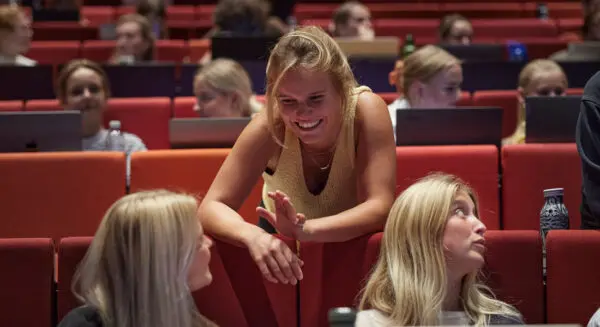
Cologne, Germany
Causal Inference in the Social Sciences
When:
04 August - 08 August 2025
Credits:
4 EC
Read more
Social Sciences
When:
11 August - 15 August 2025
School:
Summer School in Social Sciences Methods
Institution:
Università della Svizzera italiana
City:
Country:
Language:
English
Credits:
0 EC
Fee:
700 CHF

Workshop Contents and Objectives
Ethnographic methods are increasingly being used in diverse and creative ways in both long-term and short-term studies across the social sciences. This course provides a comprehensive introduction to the technical, practical and philosophical issues that arise when employing both traditional and innovative approaches.
Ethnographers immerse themselves in a setting for a period of time, listen, ask questions; and supplement observation with the analysis of interview data, documents, and visual, digital, and creative data. Ethnographic methods have proven to provide valid, valuable and rich contextual data with which to understand complex social issues and address policy concerns. The course addresses both practical and theoretical issues through: the history of ethnography and contemporary applications; plan and design of a project; accessing the field; writing fieldnotes; making sense of observational data and telling credible stories; multi-sited, virtual, visual and sensory ethnography; short-term and applied ethnography; reflexivity and the emotions in fieldwork. The course will also discuss recent debates and controversies in ethnographic methods research including ethics and power relations when conducting research. The course is practical, encouraging participants to relate topics to their own research interests and to carry out and begin to analyse micro-observational studies.
Key topics covered include:
Origins and history of ethnographic methods
Ethics, consent, safety and ethnography
Participating and observing
Interview methods: access, rapport and techniques
Positionality and identity: reflexivity, auto-ethnography, being an insider and/or outsider
Writing and using fieldnotes
Doing visual, online/virtual ethnographies
Analysing ethnographic date: inductive and deductive coding, analysing photographs, film and online sources.
Controversies and debates: managing unequal power dynamics in ethnography, ‘over-rapport’/losing ‘perspective’, ethnography with marginalised or ‘vulnerable’ groups, ethnography with privileged/powerful groups and institutions
Philosophical debates: positivism, post-modernism, grounded theory, feminist, queer and post/de-colonial ethnography
Indicative practical content will include writing interview guides, research interview practice, participant observation exercises, designing consent forms, writing fieldnotes, using film and the web for ethnographic research exercises, coding and analysis of data. Participants will have the opportunity to discuss, refine and get feedback on their own ethnographic research plans and projects.
By the end of the course, participants should:
Be able to make close, theory-oriented observations through participation, observation, and conversation.
Be equipped to record and analyse the data produced through diverse methods. Take a critical and creative approach to ethnographic methods and understand how they can be combined with other methods of data collection for a range of social, political and policy research areas.
Be in a position to present, and defend the quality and value of ethnographic interpretations.
**The Summer School cannot grant credits. We only deliver a Certificate of Participation, i.e. we certify your attendance.**
If you consider using Summer School workshops to obtain credits (ECTS), you will have to investigate at your home institution (contact the person/institute responsible for your degree) to find out whether they recognise the Summer School, how many credits can be earned from a workshop/course with roughly 35 hours of teaching, no graded work, and no exams.
Make sure to investigate this matter before registering if this is important to you.
Daniel Conway is Reader in Politics and International Relations at the University of Westminster.
graduate students, doctoral researchers, early career researchers, experienced researchers
Prerequisites
The course is introductory but intensive, rapidly taking participants from a beginner to an advanced level. Some prior familiarity with qualitative methods and background knowledge of the philosophy of social science is required. Participants should be aware that the practical decisions to be made when conducting ethnographic research are necessarily theoretically informed and will vary with each practitioner's orientation. The course aims to equip participants with the knowledge required to make those decisions for themselves in practice.
Fee
700 CHF, Reduced fee: 700 Swiss Francs per weekly workshop for students (requires proof of student status). To qualify for the reduced fee, you are required to send a copy of an official document that certifies your current student status or a letter from your supervisor stating your actual position as a doctoral or postdoctoral researcher. Send this letter/document by e-mail to methodssummerschool@usi.ch.
Fee
1100 CHF, Normal fee: 1100 Swiss Francs per weekly workshop for all others.
When:
11 August - 15 August 2025
School:
Summer School in Social Sciences Methods
Institution:
Università della Svizzera italiana
Language:
English
Credits:
0 EC

Cologne, Germany
When:
04 August - 08 August 2025
Credits:
4 EC
Read more

Copenhagen, Denmark
When:
28 July - 21 August 2025
Credits:
7.5 EC
Read more

Groningen, Netherlands
When:
26 July - 31 July 2025
Credits:
0 EC
Read more